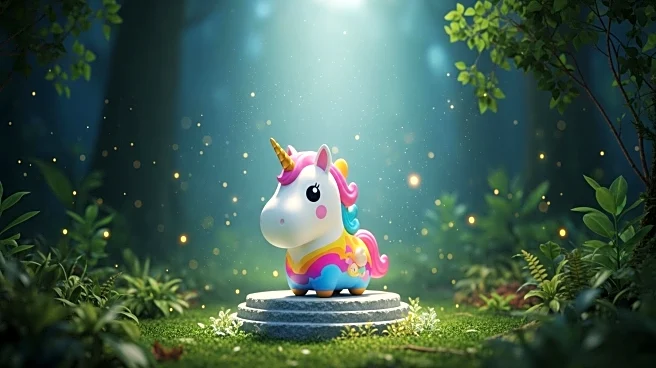What's Happening?
Pop Mart, a toy company known for its collectible plushies, has created a global sensation with its Labubu character. The demand for Labubu, a plush toy described as a 'creepy-cute stuffed rabbit-demon-elf-bear,' has led to significant scarcity, with fans worldwide struggling to purchase the item. In Beijing, Pop Mart's first store has seen eager customers joining fan group chats to receive restocking alerts. The popularity of Labubu is not limited to China; it has been featured at Milan Fashion Week, and even celebrities like Lady Gaga and Madonna have embraced the character. The scarcity has led to high resale values, with fans willing to pay significantly more than the original price.
Why It's Important?
The Labubu phenomenon underscores the power of branding and scarcity in driving consumer demand. Pop Mart's strategy of limited availability and social media engagement has created a fervent fan base willing to pay premium prices. This trend reflects broader consumer behavior where exclusivity and social currency play crucial roles in purchasing decisions. The success of Labubu also highlights the potential for collectible toys to become cultural icons, influencing fashion and entertainment. For businesses, this case study demonstrates the effectiveness of leveraging scarcity and social media to enhance brand value and consumer loyalty.
What's Next?
As demand for Labubu continues to grow, Pop Mart may explore expanding its production or introducing new characters to capitalize on the brand's popularity. The company might also consider international expansion to meet global demand. However, maintaining the balance between scarcity and availability will be crucial to sustaining consumer interest. Additionally, Pop Mart could face challenges from counterfeit products, as seen with the emergence of knockoff 'Lafufus.' The company's response to these challenges will be critical in maintaining its brand integrity and market position.
Beyond the Headlines
The Labubu craze raises questions about consumer culture and the psychological impact of scarcity marketing. The intense demand and willingness to pay high resale prices suggest a deeper cultural and emotional connection to the product. This phenomenon may also reflect broader societal trends towards valuing unique and exclusive experiences over mass-produced goods. Furthermore, the role of social media in amplifying consumer desire and creating communities around products highlights the evolving landscape of marketing and consumer engagement.








